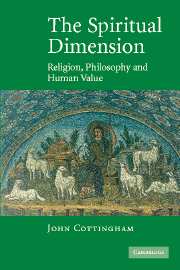Book contents
- Frontmatter
- Contents
- Preface and acknowledgements
- 1 Religion and spirituality: from praxis to belief
- 2 Religion and science: theodicy in an imperfect universe
- 3 Religion and value: the problem of heteronomy
- 4 Religion and self-discovery: the interior journey
- 5 Religion and language: emotion, symbol, and fact
- 6 Religion and the Enlightenment: modernist and postmodernist obstacles
- 7 Religion and the good life: the epistemic and moral resources of spirituality
- 8 Religion and pluralism: which spirituality?
- Bibliography
- Index
1 - Religion and spirituality: from praxis to belief
Published online by Cambridge University Press: 24 November 2009
- Frontmatter
- Contents
- Preface and acknowledgements
- 1 Religion and spirituality: from praxis to belief
- 2 Religion and science: theodicy in an imperfect universe
- 3 Religion and value: the problem of heteronomy
- 4 Religion and self-discovery: the interior journey
- 5 Religion and language: emotion, symbol, and fact
- 6 Religion and the Enlightenment: modernist and postmodernist obstacles
- 7 Religion and the good life: the epistemic and moral resources of spirituality
- 8 Religion and pluralism: which spirituality?
- Bibliography
- Index
Summary
Glaube Du! Es schadet nicht. (‘Believe! It won't hurt you.’)
Ludwig Wittgenstein.Amor ipse notitia est. (‘Love is itself knowledge.’)
Gregory the Great.FROM ANALYSIS TO EXERCISE
Bernard Williams, perhaps the most distinguished analytic moral philosopher writing at the turn of the twentieth century, once speculated that there might be something about ethical understanding that makes it inherently unsuited to be explored through the methods and techniques of analytic philosophy alone. If that is true, the point may apply a fortiori to religion, in so far as religious attitudes, even more than moral ones, often seem to encompass elements that are resistant to logical analysis. Analytic philosophers spend a great deal of their time dealing with propositions and with valid inference from one proposition to another. But as Leszek Kolakowski has reminded us in a recent book
Religion is not a set of propositions, it is the realm of worship wherein understanding, knowledge, the feeling of participation in the ultimate reality and moral commitment [all] appear as a single act, whose subsequent segregation into separate classes of metaphysical, moral and other assertions might be useful but is bound to distort the sense of the original act of worship.
This ‘distortion’ as Kolakowski terms it, is particularly apparent in academic philosophical discussions of religious issues. I have witnessed many intricate debates between theistic and atheistic protagonists in the philosophy of religion, but fascinating though these often are, I have seldom seen any of the participants give one inch of ground, as a result of the arguments advanced, let alone be moved by the arguments to modify or abandon their previous religious, or anti-religious, stance.
- Type
- Chapter
- Information
- The Spiritual DimensionReligion, Philosophy and Human Value, pp. 1 - 17Publisher: Cambridge University PressPrint publication year: 2005



